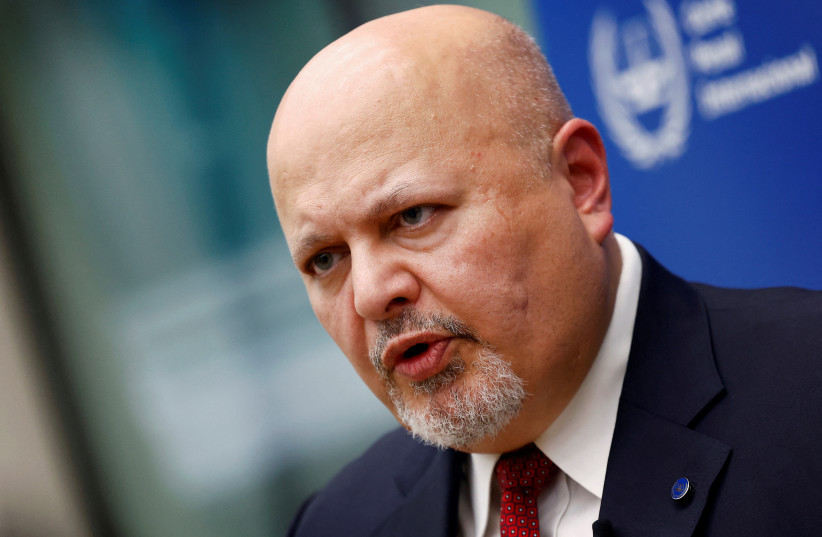
This article is more than
1 year old
“I could not have been clearer,” Khan said. “Those who do not comply with the law should not complain later when my Office takes action.
The International Criminal Court intends to issue arrest warrants for Israeli Prime Minister Benjamin Netanyahu and Defense Minister Yoav Gallant on charges of crimes against humanity for Israel’s conduct in the Gaza war, its Chief Prosecutor Karim Khan announced Monday, on the 227th day of the Gaza war.
“Today, my Office seeks to charge two of those most responsible, Netanyahu and Gallant, both as co-perpetrators and as superiors pursuant to Articles 25 and 28 of the Rome Statute,” Khan stated.
Warrants will also be issued for Hamas leaders Yahya Sinwar, Ismail Haniyeh, and Mohammed Deif, Khan said as he demanded the release of the remaining 128 hostages in Gaza.
Khan first spoke of the warrants in an interview with CNN's Christiane Amanpour and then published a video and text statement from the court.
ICC’s chief prosecutor tell CNN that he applied for arrest warrants against Israeli PM Benjamin Netanyahu & Defense Minister Yoav Gallant. The prosecutor also asked the court to issue warrants against Hamas’ Yahya Sinwar, Mohammed Deif, & Ismail Haniyeh. pic.twitter.com/B8DiXEjy07
— Abraham Gutman (@abgutman) May 20, 2024
His words put an end to the speculation as to whether the ICC would issue such warrants, a step that its pre-trail chamber must still approve.
Netanyahu and Gallant would face accusations of starvation of civilians as a method of warfare, willfully causing great suffering or serious injury to body or health, and willful killing.

The charges also include: “Extermination and/or murder,.. including in the context of deaths caused by starvation, as a crime against humanity.”
“We submit,” Khan said, “that the crimes against humanity charged were committed as part of a widespread and systematic attack against the Palestinian civilian population pursuant to State policy.
“These crimes, in our assessment, continue to this day,” Khan explained.
“Israel has intentionally and systematically deprived the civilian population in all parts of Gaza of objects indispensable to human survival,” Khan said.
At the start of the war, he said, Israel closed the three crossings into the enclave and kept them shut for extended periods of time, including the Rafah passageway from Egypt and the two Israeli land crossings at Kerem Shalom and Erez.
Withholding crucial supplies
Israel also “arbitrarily restricted the transfer of essential supplies – including food and medicine – through the border crossings after they were reopened. Water and electricity supplies were also shut down, with issues remaining until today, he added.
“My Office submits that these acts were committed as part of a common plan to use starvation as a method of war and other acts of violence against the Gazan civilian population,” Khan charged.
He noted that this was done as part of Israel’s strategy to destroy Hamas and pressure the group to release the hostages.
At the same time, he said, it was also carried out to “collectively punish the civilian population of Gaza, whom they perceived as a threat to Israel,” Khan stated.
The Palestinian suffering has been profound, he stressed, explaining that it has included, “malnutrition, dehydration, profound suffering, and an increasing number of deaths among the Palestinian population, including babies, other children, and women.”
Khan's statement comes as Israel is in its seventh month of an existential war against Hamas, which led an invasion of the Jewish state’s southern border on October 7, killing over 1,200 people and seizing 252 as hostage, out of which 128 remain in captivity.
The international community had already viewed Israel’s actions in Gaza as a war crime, with Hamas asserting that over 35,000 Palestinians had been killed in the conflict. It has verified close to 25,000 of those deaths. Israel has claimed that it killed some 14,000 Palestinian combatants in Gaza. The United Nations has warned of famine conditions in Gaza, due to the lack of a sustainable system to distribute aid in the enclave.
Israel has argued that its actions fell within the boundary of International law, stressing that there is no famine in Gaza. It has explained that it allowed entry of goods, but that Hamas stole them and the United Nations failed to properly distribute them.
Khan said that Israel, “like all States, has a right to take action to defend its population. That right, however, does not absolve Israel or any State of its obligation to comply with international humanitarian law.
“Notwithstanding any military goals they may have, the means Israel chose to achieve them in Gaza – namely, intentionally causing death, starvation, great suffering, and serious injury to the body or health of the civilian population – are criminal,” he stated.
Since last year, Khan said, his office has warned Israel to take the issue of humanitarian aid more seriously, noting that “starvation as a method of war” was against the Rome Statute.
“I could not have been clearer,” he said. “Those who do not comply with the law should not complain later when my Office takes action. That day has come.”